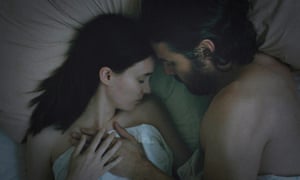david Lowery’s A Ghost Story is haunted more by sadness than fear, and a kind of black humour, drier than asbestos dust. It invites you to make what you will of its central image – a ghost wearing a sheet with eye-holes like a kid’s Halloween getup, or a big ungainly emoji. Lowery’s film has the same deadpan, unreadable quality as that white-masked face. But the shroud is worn as elegantly as the film’s own ambition and audacious simplicity.
Like Lowery’s movie Ain’t Them Bodies Saints (2013), which also starred Rooney Mara and Casey Affleck, it is a story of sundered love. But it is also a piercingly strange meditation on loss and grieving and what it means to imagine the people we love one day going on without us, and to imagine how the world is and was beyond our own fragile, temporary lives. Does such an act of imagination entail ghostlike alienation and trauma?
The unquiet spirit of Terrence Malick roams through this film’s rooms, and finally the ectoplasmid hands of M Night Shyamalan shimmer into view, grabbing the loose ends of the story’s beginning and end and tying them together.
The movie alludes to and is loosely inspired by Virginia Woolf’s 1921 story A Haunted House: its first line is quoted in the opening credits and a book falls open during the drama, revealing its crucial line about “treasure”.
Mara and Affleck play a couple living in a modest single-storey home. He is a musician and composer and she doesn’t appear to work. He is tender and loving but also sometimes abstracted and moody, often wrapped up in his music. There have been rows between them about his absences from home – for work, or maybe some other reason. She is keen to move, but he has an attachment to this rickety old place, a reluctance to leave it, for reasons that he can’t articulate. But on moving day there is a catastrophe: he is killed in a car crash and his spirit lives on, in the sheet that covered him in the morgue, and he is now aware of other ghosts, too.
As loyal and mute as an unseen dog, this ghost-man hangs around Mara wearing his deadly serious joke-store outfit, while she approaches and then pulls back from the edge of lonely despair. He even has to witness her having a romantic episode with a new man. She finally leaves the house after repainting it as a kind of therapy or exorcism, and writes a secret message on a piece of paper, sliding it into a crack in the doorframe and painting over it. And the ghost is left behind, unable to pick out the paper because his fingernails are beneath the sheet and condemned to roam the house, to watch over all its subsequent tenants, and then to haunt the property that will one day be built on its demolished remains, and even to haunt what was there before, the land staked out by midwest pioneers – a particularly brilliant and disturbing episode.
This is about the mysterious existence of an empty house, and the existences of people and places when we are not there. Maybe each of us is condemned to be an unknowable entity; each is the tree falling in the forest unheard. There’s a long, desolate but very pointed scene in which bereaved Mara simply sits down on the kitchen floor to eat herself into a miserable sickness. She is utterly alone, and it is as if she is the ghost.
As for the ghost himself, he is left unseen by the people that he haunts, but there are no cheesy cinematic effects of them moving “through” his body. It is pleasingly like a stage production of A Christmas Carol, in which the people shown to Scrooge simply pass by him. And, unlike movies such as Jerry Zucker’s Ghost (1990) with Patrick Swayze and Demi Moore or Anthony Minghella’s Truly, Madly, Deeply (1990) – both unfairly mocked and derided in their time for different reasons – there is no consolation or contact from beyond the grave.
But there is a kind of sentimental romance in the ghost’s silent stoicism and determination to carry on. The awful inevitability of death is complicated by the thought that you might have to survive, as a ghost, for reasons as arbitrary and meaningless as the cause of your death. Which is scarier still.
Since you’re here …
… we have a small favour to ask. More people are reading the Guardian than ever but advertising revenues across the media are falling fast. And unlike many news organisations, we haven’t put up a paywall – we want to keep our journalism as open as we can. So you can see why we need to ask for your help. The Guardian’s independent, investigative journalism takes a lot of time, money and hard work to produce. But we do it because we believe our perspective matters – because it might well be your perspective, too.
I appreciate there not being a paywall: it is more democratic for the media to be available for all and not a commodity to be purchased by a few. I’m happy to make a contribution so others with less means still have access to information.Thomasine F-R.
If everyone who reads our reporting, who likes it, helps to support it, our future would be much more secure.

Nenhum comentário:
Postar um comentário